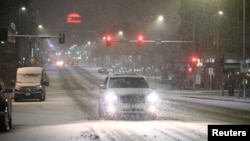A sprawling winter storm hit the South with strong thunderstorms and tornado warnings that blew roofs off homes and tossed about furniture Tuesday and brought cities across the Midwest to a standstill with more than half a foot of snow, stranding people on highways.
The violent storm with 55 mph (88 kph) winds and hail moved through the Florida Panhandle and into parts of Alabama and Georgia by sunrise Tuesday, along with at least several reports of radar-confirmed tornadoes, the National Weather Service said. A wind gust of 106 mph (171 kph) was recorded before dawn near the coast in Walton County, Florida.
“We still have potentially strong storms in that area through (Tuesday) morning and the potential for more severe weather and tornadoes,” meteorologist Lance Franck in Tallahassee said.
A section of Panama City Beach, Florida, showed parts of roofs blown away, furniture, fences and debris strewn about and a house that appeared tilted on side, leaning on another home, WJHG-TV reported.
In Panama City, about 10 miles (16 kilometers) away, police early Tuesday asked residents to stay indoors and off the roads “unless absolutely necessary” as officers checked on damage from the storms, including downed power lines and trees.
The city is in Bay County, where there had been multiple reports of tornadoes on the ground, Sheriff Tommy Ford said in a brief Facebook Live post.
“We've rescued people out of structures,” he said.
The department urged people to stay home, posting photos of crumpled structures and debris and a message that those who have taken to the roads to see it are "making it very difficult for first responders who are rushing to help people who may be trapped in damaged homes and injured.”
The Walton County sheriff's department in the Florida Panhandle posted photos of power lines draped across a road, damage to a gas station and large pieces of building materials littering the area.
Florida Gov. Ron DeSantis activated the Florida State Guard on Monday night to prepare for any storm-related impacts.
A number of schools were closed in the region and more than 140,000 customers were without power in Florida, Alabama, and Georgia, according to the PowerOutage.us website.
In the Midwest, where a snowstorm started Monday, up to 12 inches (30 centimeters) of snow could blanket a broad area stretching from southeastern Colorado all the way to the Upper Peninsula of Michigan, including western Kansas, eastern Nebraska, large parts of Iowa, northern Missouri and northwestern Illinois, said Bob Oravec, a forecaster with the National Weather Service in College Park, Maryland.
From there, the storm was expected to head east, bringing a combination of snow, rain and strong winds to the Northeast by Tuesday night, as well as concerns about flooding in areas such as New England, parts of which got more than a foot of snow Sunday.
Nearly 8 inches (19 centimeters) of snow fell in the northern city of Athol, Kansas, on Monday. The weather service office in Lincoln, Nebraska, predicted an additional 3-5 inches (8-13 centimeters) was possible overnight, with winds possibly gusting as high as 40 mph (64 kph).
Whiteout conditions in central Nebraska closed a long stretch of Interstate 80, while Kansas closed Interstate 70 from the central city of Russell all the way west to the Colorado border due to dangerous travel conditions. Several vehicles slid off I-70 in the northeastern part of the state, authorities said.
In Nebraska, federal courts in Omaha and Lincoln closed Monday, and the U.S. Army Corps of Engineers increased the water flow at a Missouri River dam on the Nebraska-South Dakota border near Yankton to reduce the chance of ice jams forming. Dubuque, on Iowa’s eastern border with Illinois, closed its city offices Tuesday. Schools in Cedar Rapids in eastern Iowa were among those also closing.
The weather has already affected campaigning for Iowa’s Jan. 15 precinct caucuses, where the snow is expected to be followed by frigid temperatures that could drift below zero degrees (minus 18 Celsius).
It forced former President Donald Trump’s campaign to cancel multiple appearances by Arkansas Gov. Sarah Sanders and her father, former Arkansas Gov. Mike Huckabee, who had been scheduled to court Iowa voters on Trump’s behalf Monday.
Parts of northern Missouri braced for up to a foot of snow as the system moved east. Officials in Kansas City, Missouri, said City Hall would be closed Tuesday and municipal courts would operate remotely.
Madison, Wisconsin, was under a winter storm warning until early Wednesday, with as much as 9 inches (23 centimeters) of snow and 40 mph (64 kph) winds on tap. City officials canceled garbage collection to prevent residents from putting trash cans along curbs and making it difficult for snowplows to navigate.
Northwestern Illinois was also under a winter storm warning with forecasts calling for 7 to 12 inches (18 to 30 centimeters) of snow by early Wednesday. The Chicago area as well as Gary, Indiana, were under winter storm advisories, with forecasts calling for up to 6 inches (15 centimeters) of snow and wind gusts of up to 30 mph (48 kph). Snowfall rates could exceed an inch per hour Tuesday, the weather service said.
Disruptions extended as far south as the Oklahoma panhandle, where Cimmaron County emergency managers asked citizens to stay home. More than a dozen motorists were stranded there Monday afternoon, with whipping winds and blizzard conditions leading to near-zero visibility, said Lea Lavielle, the county’s emergency management director.
“At this point in time, we are advising individuals to shelter in place the best they can,” Lavielle said.
Another storm was on the way that will affect the Pacific Northwest into the northern Rockies, Oravec said. Blizzard warnings were out for much of the Cascade and Olympic ranges in Washington and Oregon.




